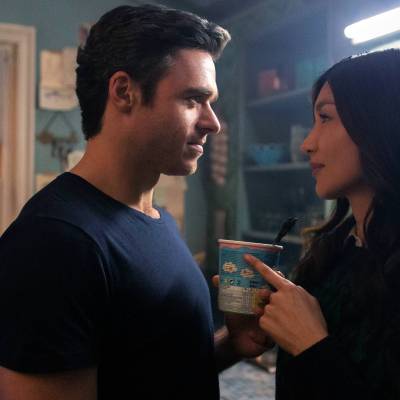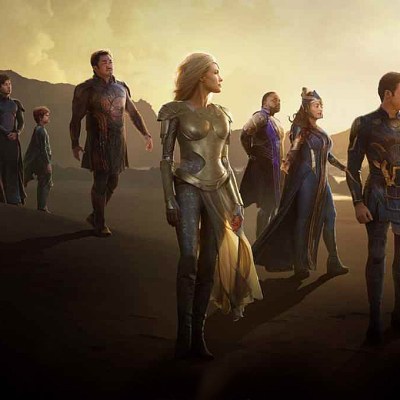How Marvel’s Eternals Succeeds Where Captain America: Civil War Failed
This article contains MAJOR ETERNALS spoilers. You can read our spoiler-free review of the MCU movie here.
If you break Marvel’s Eternals down to a barebones premise, the latest MCU film is the story of a family that loves each other but is torn asunder by ideological differences in spite of that love. It’s one of the more topical thematic explorations in the MCU pantheon—a central tension Captain America: Civil War promised us, but never fully delivered on.
Eternals isn’t about Deviants. It’s not about shepherding humanity through millennia of technological development. It’s not even about a Celestial partially emerging into the Indian Ocean. OK, it’s about all of those things—but the story at its heart, the one it commits best to, is the story of a family coming back together in a time of crisis, only to be confronted with how they all have or haven’t changed in that time apart.
Does this family still work? Do they even want to? What is each of its members willing to sacrifice in order to maintain some semblance of equanimity within the group? These are the thematic tensions Eternals grapples with in surprisingly complex and unexpected ways, building to a climax that manages to dodge most of the third-act pitfalls that plague most MCU offerings.
Civil War has a similar conceit at its center. What happens when a family—in this case, the Avengers—is faced with a major decision, only to discover that they fall on opposite sides of an ideological split?
In the lead up to Civil War, many fans (including this one) got excited to see the MCU grapple with the complex themes presented in the comics source material. In the seven-issue limited series and its loose big-screen adaptation, the U.S. government passes a Superhero Registration Act that will effectively place super-powered individuals under official regulation. The superhero community is divided in the storyline that explores the tension between freedom and security, and the film adaptation was poised to pick up the thematic threads left lingering at the end of Captain America: The Winter Soldier.
However, while Civil War presents a similar premise, with Captain America and Iron Man falling on different sides of the political argument, the film eventually pulls its ideological punches in the third act, dumbing down the conflict to an interpersonal dispute over Bucky, who killed Tony’s parents when he was the Winter Soldier. It works on an emotional level, as the MCU has spent many films developing these characters and their relationships, but it fails in its main thematic aspirations.
Eternals doesn’t have the benefit of many films of character development to support its emotional stakes, and audiences are divided on whether the movie succeeds in making us care about these characters and their drama. However, when it comes to its thematic aspirations, Eternals succeeds where Civil War could not, with members of the Eternals family brutally fighting in the film’s third act, driven by their opposing ideological beliefs.
Sersi and Ikaris
On one side, we have Sersi, the Eternal who has always loved humanity. When we first meet her present-day incarnation, she is immersed in human culture—both past, in her love of antiquities, and present, in her passion for teaching kids and in her love of Dane. She spends her evenings at the pubs, and seems happy in her mundane, human existence.
On the other side of the ideological spectrum is Ikaris, the Eternal who has removed himself from humanity in recent centuries. Unlike Sersi, he has never sought to be amongst the people, but rather to stand apart from them. In the present-day narrative, he has spent hundreds of years making peace with the idea that humanity must die so that other life in the universe can develop.
In many ways, Sersi is an outlier within her family. Like Ikaris, fellow Eternals Ajak, Gilgamesh, and Thena have all maintained a degree of isolation from humanity, even whilst remaining on Earth. Though Gilgamesh and Thena’s distance is spurred by necessity rather than choice (as Thena’s deteriorating mental condition makes her a danger to others), it is never implied that they miss the opportunity to mingle with mortals.
Kingo, Druig, and Makkari
Even Kingo and Druig, who both have a gaggle of human followers—in their Bollywood movie-making career and Amazonian cult, respectively—distance themselves from those humans within a hierarchy. They both seem to revel in their positions of power, and treat those who live in their communities as underlings rather than friends, family, or more broadly as any kind of equals.
Kingo is so emotionally detached from humanity that, when the battle to save Earth or not comes up, he simply opts out. He just doesn’t have a strong opinion on its outcome either way, which is such an unexpected superhero depiction and makes sense as a possible mindset for these god-like characters who have been brought to Earth as paternalistic stewards with a mission that has always been depicted as ending with their departure to an elsewhere home.
Makkari seems to fall somewhere close to Kingo in her connection to humanity; she seemingly has just been hanging out on the Eternals’ spaceship, waiting to go home. When a fight is forced, she sides with a majority of her family, including Druig, whom she is closest to, but it is not depicted as coming from a love for humanity.
Sprite and Phastos
Sprite and Phastos have more in common with Sersi than they do with the rest of the crew. Phastos has integrated into human society even more so than Sersi, marrying a man and fathering a child; he’s also depicted as being devastated at his part in contributing to humanity’s pain and suffering. His motivation in the final fight is unnecessarily confused by a dislike of Ikaris, which is not developed over the course of the movie but rather told to us in the third act.
Meanwhile, Sprite desperately wishes to be part of the human experience, but is kept away from it by virtue of her childlike appearance. Later in the film’s run, we are told she is and always has been in love with Ikaris (a character development that, like Phastos’ dislike of Ikaris, also feels shoehorned in at the last minute). Because of this, she sides with his character in the climactic fight for Earth’s future.
More interestingly, her character motivation here is ironically informed by wanting to be a part of humanity. Bitter that she can never be mortal in the ways she wishes to be, she would rather see humanity destroyed than continue to be forced to live alongside it yet apart.
Arishem’s Manipulation
The Eternals’ choice is made even more complicated by the reveal that Arishem (and, by extension, Ajak) has been lying to them for their entire lives on Earth. The Eternals are synthetic beings made by Arishem. They have been sent to Earth not to guide humanity to a better society but to grow the population until it is large enough to facilitate the Emergence of a Celestial, which will result in Earth’s destruction. They discover that they have lived many lives doing this exact mission on countless planets, with their memory erased after each successful Emergence.
The Eternals react to the news of Arishem’s manipulation and Earth’s impending doom in a variety of ways. Some are shocked and horrified. Others are unsurprised and/or are not particularly bothered. Ikaris is revealed to have known for centuries, a knowledge that has served to isolate himself from both his family and from humanity. While the reactions are informed by the group’s interpersonal dynamics, they are mainly driven by each member’s relationship to their original mission.
Civil War drops its ideological framework completely in its third-act throwdown between Tony and Steve, but Eternals recognizes that it doesn’t have to choose. It all comes down to the ultimate showdown between Sersi and Ikaris.
Sersi believes humanity should not be sacrificed for Tiamut to live, and that they can find another way to ensure Arishem’s master plan. Ikaris, however, believes that Tiamut must emerge now to ensure future lives elsewhere, and that Earth’s destruction is an acceptable cost. Surprisingly, the movie doesn’t depict Ikaris’ perspective as monstrous or objectively wrong, instead leaving space for the viewer (and other members of the ensemble) to wonder if Ikaris has a point. Instead, the movie makes its definitive thematic statement in Ikaris’ love for Sersi.
Ultimately, Ikaris doesn’t want to hurt Sersi more than he wants to follow his personal beliefs. And, ouch, what a tragic and relatable human experience to make your central thematic statement (though one confused by Ikaris’ cold-blooded murder of Ajak).
In the end, Civil War wasn’t ambitious enough to attempt to bring both its interpersonal drama and its ideological framework into its third act. Eternals, on the other hand, goes for it, depicting an emotional climax that shows how difficult, confusing, and heartbreaking it can be to attempt to negotiate our love for our family with our ideology—and hammering it home not in the protagonist’s climactic decision, but through what is ostensibly the film’s villain.
We all exist within families, communities, and other interpersonal networks that are inextricable from our ideology, for better and for worse. Eternals doesn’t just recognize that reality; it stakes its entire story on it… unlike Captain America: Civil War.
The post How Marvel’s Eternals Succeeds Where Captain America: Civil War Failed appeared first on Den of Geek.
From https://www.denofgeek.com/movies/how-marvels-eternals-succeeds-where-captain-america-civil-war-failed/



